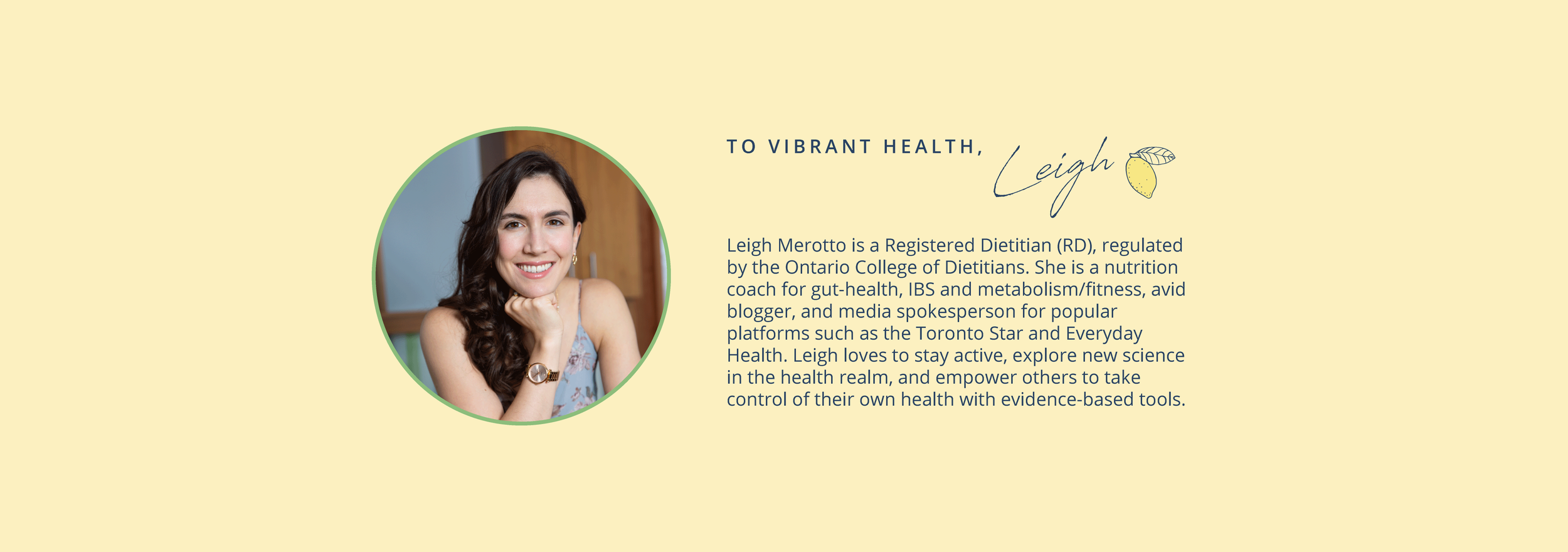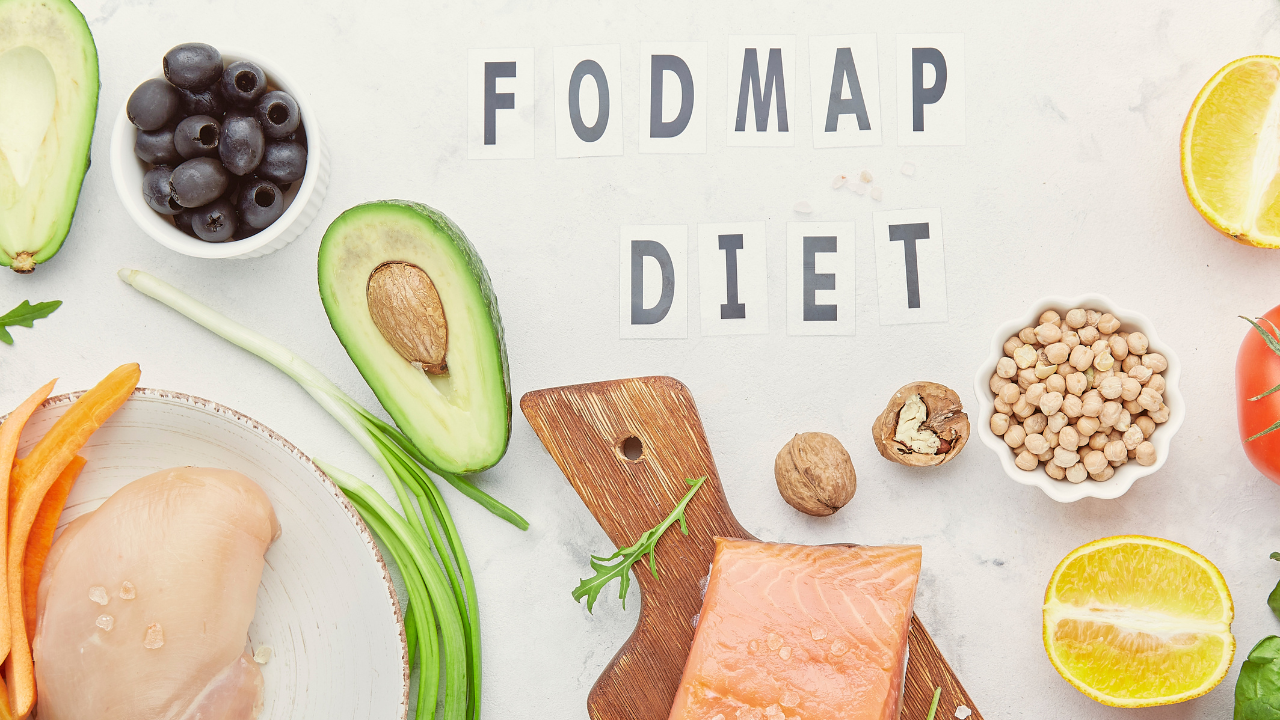Considering a Low FODMAP Diet? Why Working With a Dietitian is Essential to Success
If you're considering following a low-FODMAP diet to alleviate your IBS and gut symptoms, listen up!
Let me know if this sounds familiar.. You’ve been dealing with uncomfortable symptoms like bloating, gas, abdominal pains, constipation and diarrhea. So you went to your GP, and got referred to a Gastroenterologist. After a few tests (colonoscopy, bloodwork, all the things!) they then told you that ‘You have IBS’. Then they handed you a low FODMAP diet handout, told you to google it, and sent you out the door.
Umm, what?
Yes, unfortunately that is SO common. Or perhaps, you’ve been working with a natural health practitioner and they told you to go on a low FODMAP diet to help reduce bacterial overgrowth from SIBO, but didn’t give you any real guidance on how to do it properly, nor when it should end or HOW it should end. Equally as unfortunate…
While the low-FODMAP approach can be INCREDIBLY effective in managing the symptoms of conditions like Irritable Bowel Syndrome (IBS) and SIBO (Small Intestinal Bacterial Overgrowth), doing it properly and completing the full process is key. Furthermore, the guidance and expertise of a specialized IBS and FODMAP Dietitian are invaluable in ensuring that you navigate the diet successfully and achieve optimal results in your low FODMAP diet.
In this blog post, we will explore the reasons why working with a specialized Dietitian is essential for a successful low-FODMAP and IBS healing journey!
What is the Low FODMAP Diet?
To get things straight, let’s make sure you understand what the low FODMAP diet actually is! The low FODMAP diet is a dietary approach developed by researchers at Monash University, aimed at helping individuals manage digestive symptoms, particularly those associated with irritable bowel syndrome (IBS).
FODMAP stands for Fermentable Oligosaccharides, Disaccharides, Monosaccharides, and Polyols, which are types of carbohydrates (sugars) that are poorly absorbed by the small intestine. These undigested FODMAPs can ferment in the gut, causing symptoms such as bloating, gas, abdominal pain, and diarrhea or constipation. For those with IBS, this fermentation can trigger more severe symptoms due to the ‘intestinal hypersensitivity’ and an altered gut-brain connection that is commonly present in those with IBS. So while people without IBS may not experience severe symptoms when eating high FODMAP foods, those with IBS may get much more severe symptoms. Want to learn more about IBS and root causes? I have an article for that here.
The low FODMAP diet involves restricting or eliminating high-FODMAP foods from the diet for a period of time (a minimum of 2 to a maximum of 6 weeks) to achieve symptom relief. After this time, these foods are strategically reintroduced to help identify someone’s individual tolerance levels to the different FODMAP groups. Common high-FODMAP foods include certain fruits and vegetables like garlic and onions, wheat, dairy products, legumes, and artificial sweeteners. Through extensive research conducted at Monash University, the FODMAP content of various foods has been determined, providing valuable guidance for individuals following the low FODMAP diet.
How Does a Low FODMAP Diet Help IBS & Gut Symptoms?
A low FODMAP diet has been found to be effective in alleviating symptoms associated with irritable bowel syndrome (IBS) in up to 75% of people (an impressive statistic!)
As I have mentioned, many people with IBS are thought to have FODMAP intolerances due to ‘gut hypersensitivity’. When individuals with IBS consume high-FODMAP foods, these carbohydrates can pass through the small intestine without being properly absorbed. Once they reach the large intestine (large bowel), they become fermented by gut bacteria, leading to the production of gas and other byproducts that can cause bloating, abdominal pain, diarrhea, and other painful gut symptoms.
However, by following a ‘low FODMAP diet’, individuals reduce their intake of these fermentable carbohydrates, with the hopes of providing relief from IBS symptoms. It’s important to remember that the low FODMAP diet is actually a PROCESS, rather than a long term diet. The initial elimination phase of the diet involves avoiding or minimizing high-FODMAP foods for a set period, 2-6 weeks This helps to calm the digestive system and provides a good baseline for symptom evaluation.
In the subsequent reintroduction phase, specific high-FODMAP foods are systematically reintroduced to identify individual tolerance levels. This allows individuals to determine which FODMAPs trigger their symptoms and tailor their diet accordingly. In the personalization phase, the individual expands their diet to include foods they can tolerate well and develops their own personalized eating plan.
While the low FODMAP diet is not a permanent solution, by following this diet under the guidance of a Registered Dietitian, individuals can identify their trigger foods and develop a personalized eating plan that minimizes gut discomfort and improves their overall quality of life!
Can a low FODMAP Diet help with other GI Conditions Such as Crohn’s, Colitis, or Diverticulitis?
The low FODMAP diet has been primarily studied in patients with IBS. However, it is gaining attention for it’s use in some other GI conditions as well.
CROHN’S & COLITIS
There is thought that it may help to reduce symptoms like bloating, gas and loose stools in Inflammatory Bowel Disease (IBD) including Crohn’s and Colitis. Crohn's disease and ulcerative colitis, collectively known as inflammatory bowel disease (IBD), are chronic conditions characterized by inflammation in the gastrointestinal tract. These conditions can lead to a range of distressing symptoms, including abdominal pain, diarrhea, and fatigue. While there is no cure for Crohn's disease or ulcerative colitis, certain dietary approaches, such as the low FODMAP diet, may help manage symptoms and improve quality of life for individuals living with these conditions.
The research is minimal looking at low FODMAP and IBD management. As both of these are considered inflammatory conditions, the low FODMAP diet should also only been done under the guidance of a Dietitian to ensure nutrient needs are met (more on that below). Further, there are many triggers for IBD symptoms and not just FODMAPs alone.
DIVERTICULITIS & DIVERTICULOSIS
Diverticulitis and diverticulosis are also common gastrointestinal conditions that affect a significant portion of the population. While diverticulosis refers to the presence of small pouches, called diverticula, in the colon wall, diverticulitis occurs when these pouches become inflamed or infected. Both conditions can lead to uncomfortable symptoms such as abdominal pain, bloating, and changes in bowel habits.
While research specifically focusing on the low FODMAP diet's impact on diverticulitis and diverticulosis is limited, there is some thought that reducing FODMAPs may lower pressure in the colon and help with symptoms. Since both conditions share similar symptoms, it is reasonable to consider the potential benefits of a low FODMAP diet for individuals with diverticulitis and diverticulosis.
However, as there is a large role of inflammation in this condition, a restricted diet like low FODMAP could make symptoms and inflammation worse in time. Further, as many clients with these conditions experience constipation and stool back up, regulating bowel movements is the utmost priority. Restricting FODMAPs has little benefit for symptoms if someone is FOS (aka full of stool!).
Therefore, it is absolutely important to consult a Dietitian for dietary strategies to manage these conditions and not try FODMAP on your own or in isolation!
How Can a Specialized Dietitian Help You Follow a Low FODMAP Diet Successfully?
A specialized Dietitian would have completed the Monash FODMAP training course for Dietitians and have worked with a large base of clients with IBS and helped them complete the low FODMAP diet successfully (like myself! Learn more about my approach here).
Here is why a FODMAP trained Dietitian can help you:
IN-DEPTH KNOWLEDGE & EXPERTISE:
A FODMAP trained Dietitian has in-depth knowledge and expertise in the low-FODMAP diet as well as how it can be applied to your daily life. We are familiar with the intricacies of the low FODMAP diet, including specific food groups, FODMAP thresholds, and hidden sources of FODMAPs in different foods and products. This expertise allows us to provide accurate and up-to-date information tailored to your unique needs, ensuring that you make informed choices during the elimination and reintroduction phases! The science is always changing and the information online is not often accurate, so it is very important to have a trusted source of guidance on your low FODMAP journey.
DEVELOP A PERSONALIZED APPROACH:
Everyone's experience with IBS, gut symptoms and triggers is completely unique. A specialized Dietitian will conduct a thorough assessment of your symptoms, medical history, and lifestyle factors to develop a personalized nutrition plan that aligns with your specific needs and goals. We will take into account your individual tolerances and provide guidance on adapting the diet to suit your preferences, cultural considerations, and any additional dietary restrictions. We will also help you address non-FODMAP triggers, work on eating habits like meal timing and mindful eating, and more (because low FODMAP diet alone is not the way to completely find relief from symptoms!).
SAFE AND NUTRITIONALLY BALANCED DIET:
The low-FODMAP diet can be VERY restrictive, which is likely to impact your nutrient intake if not implemented and planned out properly. As Dietitians, we prioritize helping you have a nutritionally balanced diet throughout the elimination and reintroduction phases. We will help ensure that you receive adequate nutrients, vitamins, and minerals by providing guidance on suitable alternative foods, appropriate portion sizes, efficient meal planning and prepping, and potential evidence-based supplementation to fill the gaps when necessary.
In my practice, I see MOST people who have tried the low FODMAP diet on their own fallen short on meeting many key nutrient requirements. Many of which are so important for gut health and function, so this leads them to actually not responding as well as they can on the low FODMAP diet! Thus, making sure your diet is nutritionally balanced is absolutely key to successful digestive health, gut healing and IBS management.
ACCURATE FOOD SELECTION AND LABEL READING:
Identifying high and low-FODMAP foods can be challenging, as FODMAP content varies across different food products (and there are a LOT of products out there!). A specialized Dietitian can guide you in making accurate food choices and interpreting food labels to avoid hidden sources of FODMAPs. This knowledge can empower you to confidently select suitable food options while grocery shopping or dining out, reducing the risk of inadvertently consuming trigger foods.
In my Gut Harmony Method program, clients are provided with resources on accurate food labelling, as well as my top list of low FODMAP products that are also healthy they can reference when grocery shopping!
SUCCESSFUL REINTRODUCTION AND PERSONALIZATION PHASE:
The reintroduction phase of the low-FODMAP diet is absolutely critical for identifying individual FODMAP triggers and customizing your diet for long-term management. Sadly, I see many people start the low FODMAP diet on their own, and then fall off of it because they weren't aware of how to successful reintroduce foods back and identify specific tolerance levels. Further, some do not do the reintroduction at all, which we know may negatively impact the gut microbiome health as well as lead to food anxiety and a poor relationship with food long term.
However, if doing the low FODMAP diet alongside a Dietitian, a specialized Dietitian will guide you through the reintroduction phase systematically (with guidelines set out by Monash University), ensuring that potential triggers are reintroduced in a controlled manner with minimal variables. We will monitor and interpret your body's responses, helping you identify specific FODMAPs and serving sizes that may exacerbate your symptoms. This knowledge enables you to customize your long-term diet, maximizing symptom relief while maintaining dietary diversity. Because that’s the goal of successful IBS management - the most liberal diet, with minimal symptoms!
BEHAVIORAL SUPPORT AND COPING STRATEGIES:
Following a low-FODMAP diet can be challenging from a behavioral standpoint, affecting social interactions, emotional well-being, and your overall quality of life. While IBS can affect quality of life, when following a restrictive diet like low FODMAP, this can sometimes be worse rather than better if not done properly. A specialized Dietitian understands the emotional and social impact of dietary restrictions and can provide guidance on coping strategies, practical tips for dining out or traveling, and ways to maintain a positive relationship with food while managing your gut symptoms.
In my coaching program, clients are provided with tools on eating out confidently with IBS, restaurant and travel guides for low FODMAP, and more applicable tools. You want to THRIVE with IBS, and not fear enjoying your life!
ONGOING SUPPORT AND MONITORING:
Managing gut symptoms and dietary modifications is an ongoing process. A specialized Dietitian will provide ongoing support and monitoring throughout your low-FODMAP and gut healing journey. Regular follow-up appointments allow us to track your progress, address any challenges or concerns, and make adjustments to your nutrition plan as needed. This ongoing partnership ensures that you receive the guidance and support necessary to achieve long-term success!
INTEGRATIVE APPROACH:
A Dietitian that specializes in low FODMAP and gut health (like myself), should help you to address multiple aspects of digestive health and IBS management, NOT high FODMAP foods alone. The key to finding long term success is lowering inflammation, rebalancing your microbiome, and helping your gut to function optimally.
FODMAP intolerances are only one part of the picture with IBS and gut symptoms, so it is integral that other factors such as meal timing and spacing, mindful eating, gut-brain support, sleep, stress management and tailored supplementation are all part of your plan. This is exactly why I created the Gut Harmony Method Program!
Why a Dietitian-Led IBS & Low FODMAP Program Could Be What You Need
Now that we’ve laid down what a specialized Dietitian does, are you looking for the next steps to work with one?
In my practice, I help clients not only identify their food triggers and tolerance levels with a full or gentle low FODMAP diet, but also work to HEAL their gut and rebalance the gut-microbiome through evidence-based strategies so that they can tolerate MORE foods long term.
Here are the ways I can help support you on your gut health and low FODMAP journey:
1-1 Coaching - Gut Harmony Method Program: My flagship 1-1 coaching program to help individuals with IBS, SIBO and persistent gut symptoms to get to the root of their symptoms, increase energy, regulate their bowel habits and digestion, and support long-term digestive harmony. Learn more and apply here.
Gut Harmony Society - IBS Course & Community: An integrative online course with community support to help you break free from IBS and gut problems, complete the low FODMAP process, regulate your bowels, increase energy, and create sustainable long term habits. Learn more here.
Find the Right Fit for Your FODMAP Dietitian
It’s important to also find the right practitioner that can give you the tools and support you need to successfully implement a low FODMAP diet while also making it realistic to your needs and resources.
I hold 30-minute free clarity calls with all prospective clients so we can get to know each other, discuss their goals and next steps if it is a good fit to work together.
Conclusion
Working with a specialized Dietitian when following a low-FODMAP diet and managing IBS is crucial for effectively managing gut symptoms long-term. Our expertise, personalized and evidence-based approach, accurate food selection guidance, and ongoing support can significantly enhance your experience and outcomes.
By working with a specialized Dietitian, you can confidently navigate the low-FODMAP diet, identify trigger foods, and customize your long-term approach to achieve optimal symptom relief and improved gut health.
Summary:
The low FODMAP diet is a dietary approach developed by researchers at Monash University, aimed at helping individuals manage digestive symptoms associated with irritable bowel syndrome (IBS) like bloating, gas, distention, diarrhea and abdominal pain
While research has been focused on IBS & the low FODMAP diet, a low FODMAP diet may help with symptom management and improve quality of life in other GI conditions such as Crohn’s, Colitis, and Diverticulosis. However, these conditions involve chronic inflammation which could be worsened by the restrictive nature of the low FODMAP diet and should be done with careful planning.
A specialized Dietitian can help you follow complete the low FODMAP diet stages (elimination, reintroduction and personalization) successfully by supporting nutritional safety and adequacy, supporting behavior change, and help with monitoring/troubleshooting.
IBS is complex and the low FODMAP diet is only one part of symptom management, therefore it is important to work on other strategies like mindful eating, hydration, adequate nutrition, sleep and stress support
Find the right fit for a Dietitian and look for someone who has worked with many IBS clients on a low FODMAP diet and completed the Monash FODMAP training course for Dietitians
Ready to take the next step and determine what dietary strategies YOU need to find freedom from IBS symptoms like bloating, gas, pain, fatigue and irregular bowels? Learn more and apply for my 1-1 Gut Harmony Method Program here.













